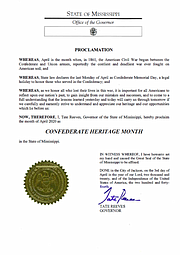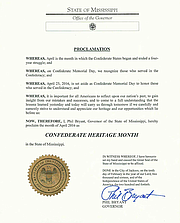Friday, April 10, 2020
Sons of Confederate Veterans Commander-in-Chief Michael Givens spoke the the SCV's Annual Reunion in Vicksburg, Miss., in 2013. Mississippi Lt. Gov. Tate Reeves was among those speaking. Photo courtesy SCVORG channel on YouTube
Since the Jackson Free Press broke the story Sunday that Gov. Tate Reeves had quietly signed a proclamation declaring the month of April “Confederate Heritage Month,” his office had not returned repeated messages for a response. Until yesterday, April 9, no other media had asked him about it in his daily COVID-19 pressers.
Jackson Free Press reporter Nick Judin had started covering the live streams of the pressers for safety reasons, but that meant he could not ask questions of the governor. But by Thursday the governor's press conferences had switched to Zoom allowing reporters to ask questions, if not follow-ups (they cut the mics after the first question). Near the end of the briefing, Nick spoke up and asked if a coronavirus pandemic—which is infecting and killing African Americans in Mississippi disproportionately—was the right time to sign such a proclamation that offends so many people.
The governor did not answer Nick’s actual question, saying instead:
“That is a state statute, which declares the first Monday in April a state holiday. It is an executive order or resolution that every governor of Mississippi has signed dating back for many, many, many years regarding the month of April. And again it’s driven by that statute that names the last Monday in April a state holiday.”
That, however, is not true. Despite efforts by the pro-Confederacy lobby, the state has not adopted a law requiring Confederate Heritage Month. The statute doesn’t exist. What does exist is a law declaring Confederate Memorial Day—the last Monday in April, not the first Monday as Reeves first said in his muddled response to Nick yesterday. State offices close on that day every year. Mississippi also celebrates Robert E. Lee's birthday alongside Dr. Martin Luther King Jr.'s birthday on the third Monday of January.
One day does not a whole month make, legally or otherwise.
Repeats Similar Answer to PBS
In an interview on PBS Newshour last night, Reeves restated the same talking point, but a bit more succinctly that time.
“Well, Mississippi has a state statute that makes that a holiday in the state of Mississippi,” Reeves said, still conflating Confederate Memorial Day, a legal holiday, with his proclamation, which state law does not require. “It’s the last Monday in April, and every governor has signed exactly the same proclamation.”
It is true that previous governors had chosen to sign a Confederate Heritage Month proclamation, as the Jackson Free Press reported in 2016 when we figured out Gov. Phil Bryant had signed this proclamation that previous governors had also signed quietly to please the Sons of Confederate Veterans.
But Reeves still did not answer the question.
Like Nick Judin earlier that day, PBS had also asked the governor if it was “appropriate” to sign it during the COVID-19 pandemic. Once again, the governor avoided the actual question.
Reeves' Order Different from Previous Orders
The governor also said on PBS that his proclamation is "exactly" the same as previous orders. That is also not true.
The language varies in significant ways between Bryant’s 2016 order and the 2020 version Reeves signed on April 3, for instance. Bryant’s version gave responsibility for the Civil War fully to the Confederacy. His 2016 proclamation began: “April is the month when the Confederate states began and ended a four-year struggle.” Indeed, the South started the conflict by firing on Fort Sumter, S.C., on April 12, 1861, over the right to own and extend slavery to new U.S. states, and to force other states to return runaways to the South.
Reeves’ opening “whereas,” however, spreads the responsibility for the war more evenly between the north and the south. “April is the month when, in 1861, the American Civil War began between the Confederate and Union armies, reportedly the costliest and deadliest war ever fought on American soil…,” his proclamation begins.
Both governors’ proclamations then mention that the last Monday in April is a state holiday in Mississippi called “Confederate Memorial Day.” Several southern states still commemorate the day the last major Confederate field army surrendered to the Union at Bennett Place in Durham, N.C., on Wednesday, April 26, 1865, officially ending the war.
The last “whereas” is virtually the same in the 2016 and 2020 versions, except that Reeves adds “as we honor all who lost their lives in this war” before proclaiming “it is important for all Americans to reflect upon our nation’s past, to gain insight from our mistakes and successes, and to come to a full understanding that the lessons learned yesterday and today will carry us through tomorrow if we carefully and earnestly strive to understand and appreciate our heritage and our opportunities which lie before us.”
Reeves' 2020 order is most different, though, from Bryant's 2019 order. Last year, as he faced term limits, Bryant decided to declare "Unity Month" instead of "Confederate Heritage Month," responding to a request by Unite Mississippi, a Flowood, Miss.-based nonprofit that focuses on racial and social reconciliation among Christians in Mississippi.
Email Editor-in-chief Donna Ladd at [email protected] and follow her on Twitter at @donnerkay.


